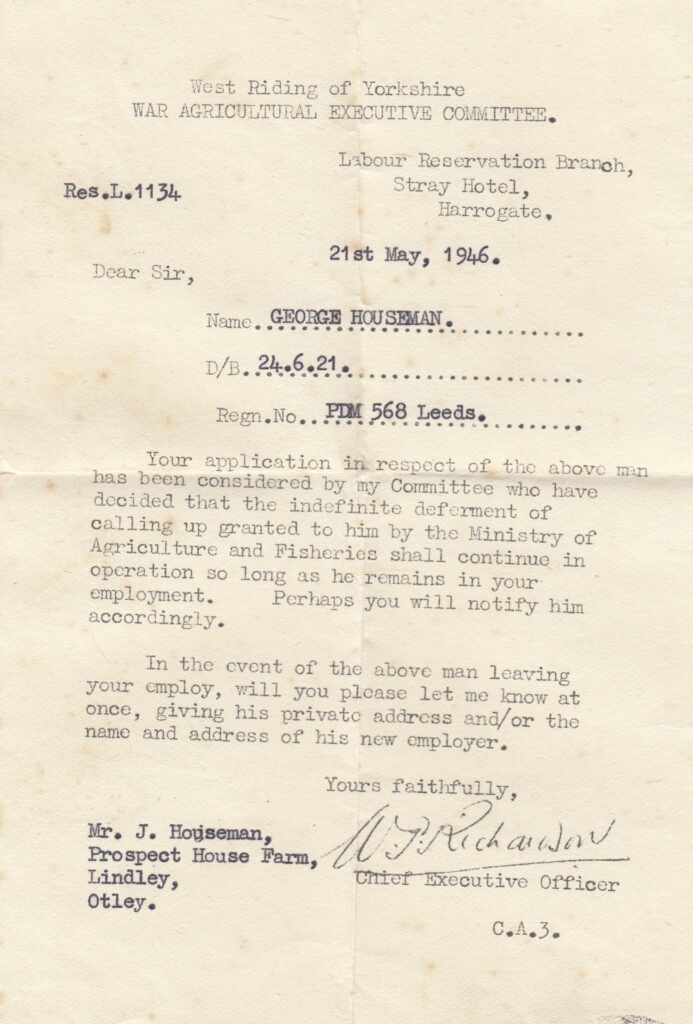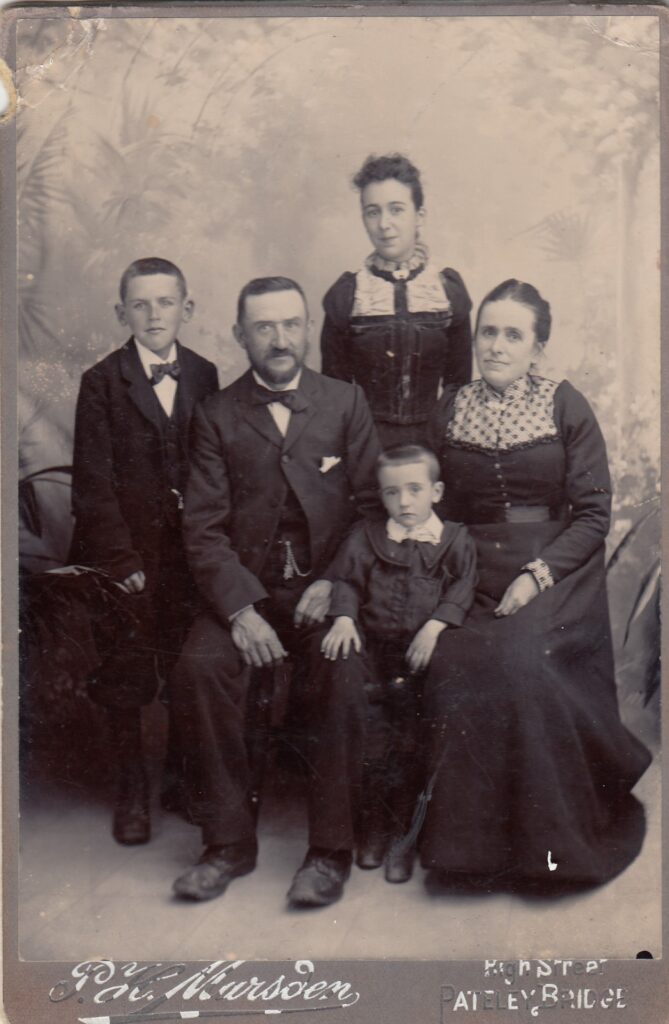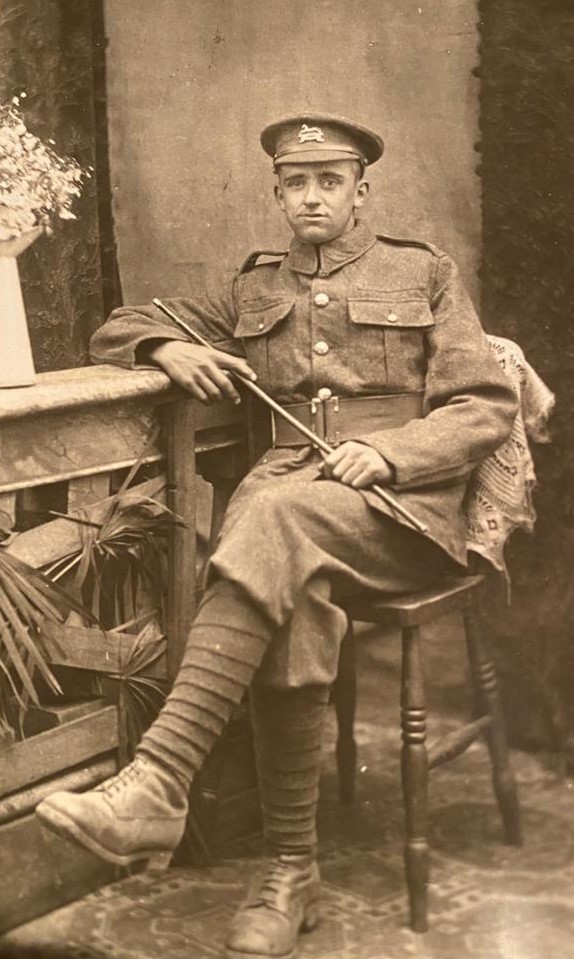
It is a family “truth” that, as farmers, we were exempt from military service in both WW1 and WW2. The “truth” of this statement is more complex than it first seems. Whilst none of my direct ancestors fought in either war, several siblings and cousins did including my great, great uncle, William Henry Barrett.
The truth that many farmers didn’t end up on the front line is illustrated through this letter dated 21 May 1946 in relation to George Houseman, my father’s father (Grandad), who had “indefinite deferment of calling up granted to him by the Ministry of Agriculture and Fisheries.” The letter was sent to his employer, Jesse Houseman, who also happened to be his father-in-law…….

Farming was a reserved occupation but only once you had reached the age of 25. On my Mum’s side, my Grandpy was eighteen when war broke out, his brother, Henry, twenty-one so both of age to fight. The story passed down is that my great grandfather (George Thomas) sent one of his sons to work elsewhere to avoid them being drafted. We’d always understood it to be my Uncle Henry (the oldest brother) who worked elsewhere but it’s my Grandpy that I can’t find on the 1939 register. Whoever it was, both Grandpy and his brother joined the Home Front in 1941 and did their part in serving the country. This approach was well supported by the local estate manager as the only person from the local community who was drafted to the front was one who had, apparently, fallen out with his father.
But why was George Thomas so keen to keep his sons from the front? This is where William Henry comes in. William Henry was the third and last child of Jane Brooks & Henry Barrett. He was born on 5 December 1894, seven years after his brother, my great grandfather, George Thomas, and fourteen years after his sister, Mary Elizabeth. In photos he very much looks like the cosseted (perhaps unexpected) baby of the family and most definitely on the puny side.

When war broke out in 1914 many in the locality volunteered to serve. The records of those serving in the 6th battalion of the Duke of Wellington’s West Riding regiment are helpfully captured in the wonderfully evocative book “Craven’s part in the Great War” which opens with the following: “A humble but sincere expression…of the gallant, heroic and self-sacrificing spirit shown by the sons of Craven in resisting the unscrupulous, malignant and pre-arranged design of Germany and her dupes to crush the British Empire and the civilised countries associated with her.” The authors being “confident that the volume will be treasured as an honoured heirloom in every family who representative has done his share in freeing our beloved Empire from the slavery of German hatred and military aggression.” Sadly, this “honoured heirloom” has failed to make it into my hands.

William’s service record seems to be one of the many destroyed in the blitz. What we do know is that, by 1915, Private W. H Barrett (regiment number 267160) was serving in the 2/6th Battalion of the Duke of Wellington (West Riding) Regiment, later transferring to the Labour Corps (regiment number 420996). In some senses it seems that William may have been lucky, the 2/6th battalion was a home services “second line” unit and did not serve at the front until 1917 by which time William may well have transferred to the Labour Corps. His service seems to be neither distinguished nor undistinguished, just one of the many young men that went to war and came back, seemingly physically unharmed (as evidenced by WW1 pension records).

When William’s father, Henry, died in April 1924 his will included a specific bequest of farm stock and implements “in acknowledgement of his service for his country in the late war” presumably setting William up to take over the family farm at Throstle Nest.
Sadly, William only lived a few more weeks. He died on 20 May 1924 of tuberculosis, aged just 29. Unmarried and childless, William is buried with his parents in Pateley Bridge cemetery.

We can’t know whether William caught tuberculosis whilst on active duty and yet his family may have suspected this as being the reason. Perhaps William’s last legacy was to ensure his nephews weren’t put in the same situation when WW2 broke out just a few short years later.
With much gratitude to William Henry Barrett for his service and for his legacy which kept my Grandpy safe from war, to the long long trail for helping me make sense of the regiments and to all those who served. Also, to Amy Johnson Crow whose 52 ancestors in 52 weeks challenge encouraged me to publish this series of stories.
Read more about WW1 & Greenhow Hill in what a birthday date book taught me about WW1 – the first of two stories from Mary Wellock’s birthday date book

Thanks Natasha. I do have copies of the photographs but I did not know they were of WH Barrett.
My mother told me he died from meningitis. Jane Brooks Barrett was angry because she said that the doctor was ‘canoodling’ with a woman by the river and not hurrying to his patient. That is why WHB died: I do not think so. Jane Brooks Barrett then came to live in Middlesmoor, until her death.
WHB was great friends with Frank Barrett. My mother thought that WHB joined him in Flying Corps but I have found no evidence of that .